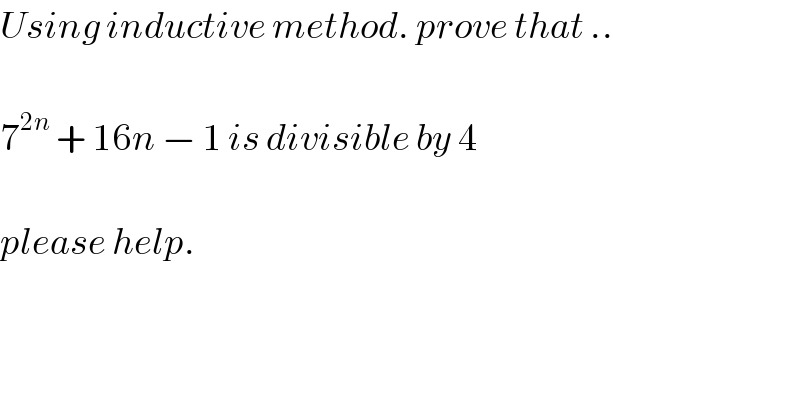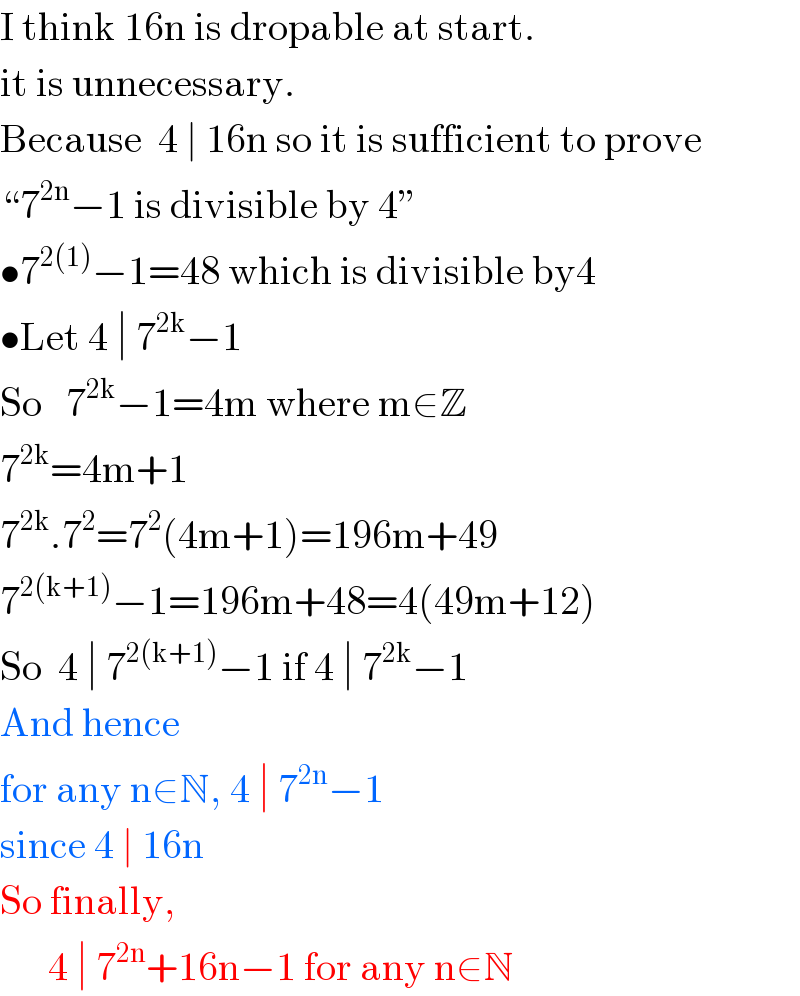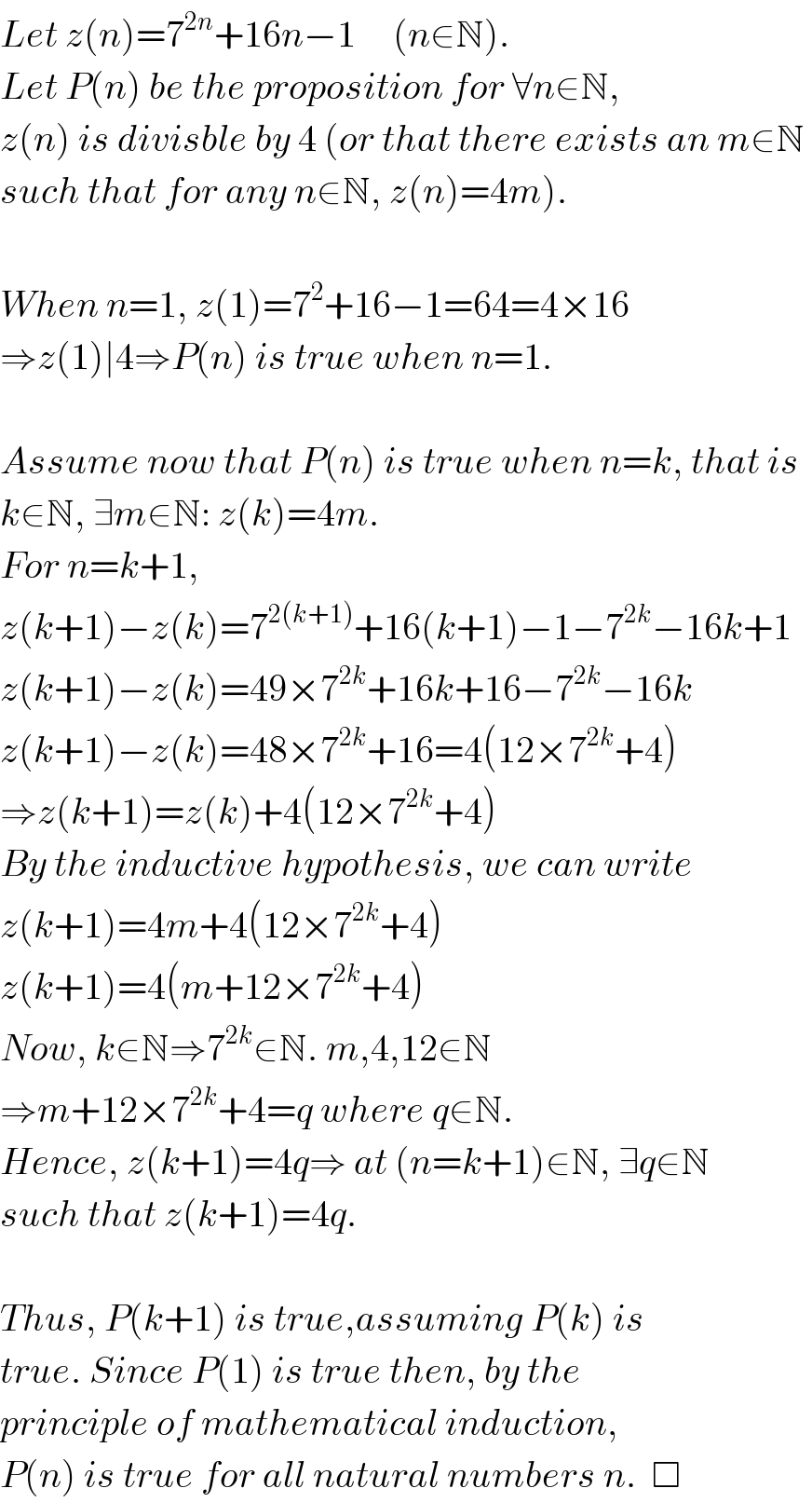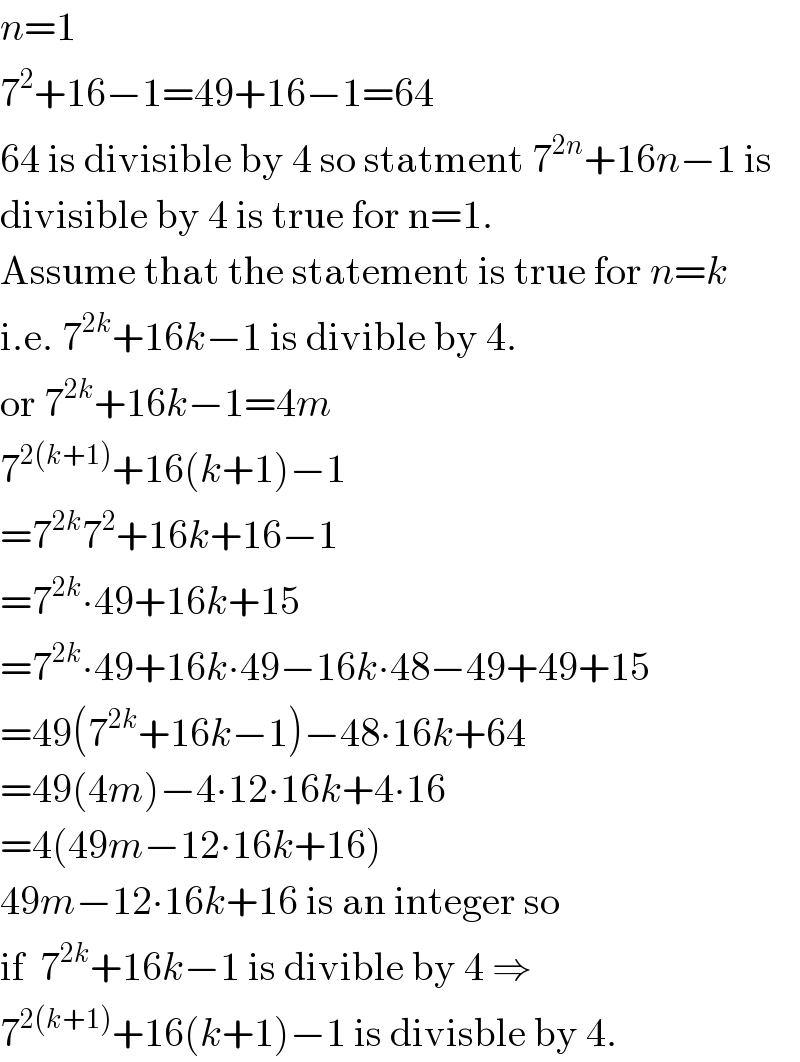
Question Number 5673 by sanusihammed last updated on 23/May/16

$${Using}\:{inductive}\:{method}.\:{prove}\:{that}\:.. \\ $$$$ \\ $$$$\mathrm{7}^{\mathrm{2}{n}} \:+\:\mathrm{16}{n}\:−\:\mathrm{1}\:{is}\:{divisible}\:{by}\:\mathrm{4} \\ $$$$ \\ $$$${please}\:{help}. \\ $$
Commented by Rasheed Soomro last updated on 24/May/16

$$\mathrm{I}\:\mathrm{think}\:\mathrm{16n}\:\mathrm{is}\:\mathrm{dropable}\:\mathrm{at}\:\mathrm{start}. \\ $$$$\mathrm{it}\:\mathrm{is}\:\mathrm{unnecessary}. \\ $$$$\mathrm{Because}\:\:\mathrm{4}\:\mid\:\mathrm{16n}\:\mathrm{so}\:\mathrm{it}\:\mathrm{is}\:\mathrm{sufficient}\:\mathrm{to}\:\mathrm{prove} \\ $$$$``\mathrm{7}^{\mathrm{2n}} −\mathrm{1}\:\mathrm{is}\:\mathrm{divisible}\:\mathrm{by}\:\mathrm{4}'' \\ $$$$\bullet\mathrm{7}^{\mathrm{2}\left(\mathrm{1}\right)} −\mathrm{1}=\mathrm{48}\:\mathrm{which}\:\mathrm{is}\:\mathrm{divisible}\:\mathrm{by4} \\ $$$$\bullet\mathrm{Let}\:\mathrm{4}\:\mid\:\mathrm{7}^{\mathrm{2k}} −\mathrm{1}\: \\ $$$$\mathrm{So}\:\:\:\mathrm{7}^{\mathrm{2k}} −\mathrm{1}=\mathrm{4m}\:\mathrm{where}\:\mathrm{m}\in\mathbb{Z} \\ $$$$\mathrm{7}^{\mathrm{2k}} =\mathrm{4m}+\mathrm{1} \\ $$$$\mathrm{7}^{\mathrm{2k}} .\mathrm{7}^{\mathrm{2}} =\mathrm{7}^{\mathrm{2}} \left(\mathrm{4m}+\mathrm{1}\right)=\mathrm{196m}+\mathrm{49} \\ $$$$\mathrm{7}^{\mathrm{2}\left(\mathrm{k}+\mathrm{1}\right)} −\mathrm{1}=\mathrm{196m}+\mathrm{48}=\mathrm{4}\left(\mathrm{49m}+\mathrm{12}\right) \\ $$$$\mathrm{So}\:\:\mathrm{4}\:\mid\:\mathrm{7}^{\mathrm{2}\left(\mathrm{k}+\mathrm{1}\right)} −\mathrm{1}\:\mathrm{if}\:\mathrm{4}\:\mid\:\mathrm{7}^{\mathrm{2k}} −\mathrm{1} \\ $$$$\mathrm{And}\:\mathrm{hence} \\ $$$$\mathrm{for}\:\mathrm{any}\:\mathrm{n}\in\mathbb{N},\:\mathrm{4}\:\mid\:\mathrm{7}^{\mathrm{2n}} −\mathrm{1} \\ $$$$\mathrm{since}\:\mathrm{4}\:\mid\:\mathrm{16n} \\ $$$$\mathrm{So}\:\mathrm{finally}, \\ $$$$\:\:\:\:\:\:\mathrm{4}\:\mid\:\mathrm{7}^{\mathrm{2n}} +\mathrm{16n}−\mathrm{1}\:\mathrm{for}\:\mathrm{any}\:\mathrm{n}\in\mathbb{N} \\ $$
Answered by Yozzii last updated on 24/May/16

$${Let}\:{z}\left({n}\right)=\mathrm{7}^{\mathrm{2}{n}} +\mathrm{16}{n}−\mathrm{1}\:\:\:\:\:\left({n}\in\mathbb{N}\right). \\ $$$${Let}\:{P}\left({n}\right)\:{be}\:{the}\:{proposition}\:{for}\:\forall{n}\in\mathbb{N}, \\ $$$${z}\left({n}\right)\:{is}\:{divisble}\:{by}\:\mathrm{4}\:\left({or}\:{that}\:{there}\:{exists}\:{an}\:{m}\in\mathbb{N}\:\right. \\ $$$$\left.{such}\:{that}\:{for}\:{any}\:{n}\in\mathbb{N},\:{z}\left({n}\right)=\mathrm{4}{m}\right). \\ $$$$ \\ $$$${When}\:{n}=\mathrm{1},\:{z}\left(\mathrm{1}\right)=\mathrm{7}^{\mathrm{2}} +\mathrm{16}−\mathrm{1}=\mathrm{64}=\mathrm{4}×\mathrm{16} \\ $$$$\Rightarrow{z}\left(\mathrm{1}\right)\mid\mathrm{4}\Rightarrow{P}\left({n}\right)\:{is}\:{true}\:{when}\:{n}=\mathrm{1}. \\ $$$$ \\ $$$${Assume}\:{now}\:{that}\:{P}\left({n}\right)\:{is}\:{true}\:{when}\:{n}={k},\:{that}\:{is} \\ $$$${k}\in\mathbb{N},\:\exists{m}\in\mathbb{N}:\:{z}\left({k}\right)=\mathrm{4}{m}. \\ $$$${For}\:{n}={k}+\mathrm{1}, \\ $$$${z}\left({k}+\mathrm{1}\right)−{z}\left({k}\right)=\mathrm{7}^{\mathrm{2}\left({k}+\mathrm{1}\right)} +\mathrm{16}\left({k}+\mathrm{1}\right)−\mathrm{1}−\mathrm{7}^{\mathrm{2}{k}} −\mathrm{16}{k}+\mathrm{1} \\ $$$${z}\left({k}+\mathrm{1}\right)−{z}\left({k}\right)=\mathrm{49}×\mathrm{7}^{\mathrm{2}{k}} +\mathrm{16}{k}+\mathrm{16}−\mathrm{7}^{\mathrm{2}{k}} −\mathrm{16}{k} \\ $$$${z}\left({k}+\mathrm{1}\right)−{z}\left({k}\right)=\mathrm{48}×\mathrm{7}^{\mathrm{2}{k}} +\mathrm{16}=\mathrm{4}\left(\mathrm{12}×\mathrm{7}^{\mathrm{2}{k}} +\mathrm{4}\right) \\ $$$$\Rightarrow{z}\left({k}+\mathrm{1}\right)={z}\left({k}\right)+\mathrm{4}\left(\mathrm{12}×\mathrm{7}^{\mathrm{2}{k}} +\mathrm{4}\right) \\ $$$${By}\:{the}\:{inductive}\:{hypothesis},\:{we}\:{can}\:{write} \\ $$$${z}\left({k}+\mathrm{1}\right)=\mathrm{4}{m}+\mathrm{4}\left(\mathrm{12}×\mathrm{7}^{\mathrm{2}{k}} +\mathrm{4}\right) \\ $$$${z}\left({k}+\mathrm{1}\right)=\mathrm{4}\left({m}+\mathrm{12}×\mathrm{7}^{\mathrm{2}{k}} +\mathrm{4}\right) \\ $$$${Now},\:{k}\in\mathbb{N}\Rightarrow\mathrm{7}^{\mathrm{2}{k}} \in\mathbb{N}.\:{m},\mathrm{4},\mathrm{12}\in\mathbb{N} \\ $$$$\Rightarrow{m}+\mathrm{12}×\mathrm{7}^{\mathrm{2}{k}} +\mathrm{4}={q}\:{where}\:{q}\in\mathbb{N}. \\ $$$${Hence},\:{z}\left({k}+\mathrm{1}\right)=\mathrm{4}{q}\Rightarrow\:{at}\:\left({n}={k}+\mathrm{1}\right)\in\mathbb{N},\:\exists{q}\in\mathbb{N} \\ $$$${such}\:{that}\:{z}\left({k}+\mathrm{1}\right)=\mathrm{4}{q}. \\ $$$$ \\ $$$${Thus},\:{P}\left({k}+\mathrm{1}\right)\:{is}\:{true},{assuming}\:{P}\left({k}\right)\:{is} \\ $$$${true}.\:{Since}\:{P}\left(\mathrm{1}\right)\:{is}\:{true}\:{then},\:{by}\:{the} \\ $$$${principle}\:{of}\:{mathematical}\:{induction}, \\ $$$${P}\left({n}\right)\:{is}\:{true}\:{for}\:{all}\:{natural}\:{numbers}\:{n}.\:\:\Box \\ $$
Commented by sanusihammed last updated on 24/May/16

$${I}\:{really}\:{appreciate}\:{this}\:.\:{thank}\:{you}. \\ $$
Answered by prakash jain last updated on 23/May/16

$${n}=\mathrm{1} \\ $$$$\mathrm{7}^{\mathrm{2}} +\mathrm{16}−\mathrm{1}=\mathrm{49}+\mathrm{16}−\mathrm{1}=\mathrm{64} \\ $$$$\mathrm{64}\:\mathrm{is}\:\mathrm{divisible}\:\mathrm{by}\:\mathrm{4}\:\mathrm{so}\:\mathrm{statment}\:\mathrm{7}^{\mathrm{2}{n}} +\mathrm{16}{n}−\mathrm{1}\:\mathrm{is} \\ $$$$\mathrm{divisible}\:\mathrm{by}\:\mathrm{4}\:\mathrm{is}\:\mathrm{true}\:\mathrm{for}\:\mathrm{n}=\mathrm{1}. \\ $$$$\mathrm{Assume}\:\mathrm{that}\:\mathrm{the}\:\mathrm{statement}\:\mathrm{is}\:\mathrm{true}\:\mathrm{for}\:{n}={k} \\ $$$$\mathrm{i}.\mathrm{e}.\:\mathrm{7}^{\mathrm{2}{k}} +\mathrm{16}{k}−\mathrm{1}\:\mathrm{is}\:\mathrm{divible}\:\mathrm{by}\:\mathrm{4}. \\ $$$$\mathrm{or}\:\mathrm{7}^{\mathrm{2}{k}} +\mathrm{16}{k}−\mathrm{1}=\mathrm{4}{m} \\ $$$$\mathrm{7}^{\mathrm{2}\left({k}+\mathrm{1}\right)} +\mathrm{16}\left({k}+\mathrm{1}\right)−\mathrm{1} \\ $$$$=\mathrm{7}^{\mathrm{2}{k}} \mathrm{7}^{\mathrm{2}} +\mathrm{16}{k}+\mathrm{16}−\mathrm{1} \\ $$$$=\mathrm{7}^{\mathrm{2}{k}} \centerdot\mathrm{49}+\mathrm{16}{k}+\mathrm{15} \\ $$$$=\mathrm{7}^{\mathrm{2}{k}} \centerdot\mathrm{49}+\mathrm{16}{k}\centerdot\mathrm{49}−\mathrm{16}{k}\centerdot\mathrm{48}−\mathrm{49}+\mathrm{49}+\mathrm{15} \\ $$$$=\mathrm{49}\left(\mathrm{7}^{\mathrm{2}{k}} +\mathrm{16}{k}−\mathrm{1}\right)−\mathrm{48}\centerdot\mathrm{16}{k}+\mathrm{64} \\ $$$$=\mathrm{49}\left(\mathrm{4}{m}\right)−\mathrm{4}\centerdot\mathrm{12}\centerdot\mathrm{16}{k}+\mathrm{4}\centerdot\mathrm{16} \\ $$$$=\mathrm{4}\left(\mathrm{49}{m}−\mathrm{12}\centerdot\mathrm{16}{k}+\mathrm{16}\right) \\ $$$$\mathrm{49}{m}−\mathrm{12}\centerdot\mathrm{16}{k}+\mathrm{16}\:\mathrm{is}\:\mathrm{an}\:\mathrm{integer}\:\mathrm{so} \\ $$$$\mathrm{if}\:\:\mathrm{7}^{\mathrm{2}{k}} +\mathrm{16}{k}−\mathrm{1}\:\mathrm{is}\:\mathrm{divible}\:\mathrm{by}\:\mathrm{4}\:\Rightarrow \\ $$$$\mathrm{7}^{\mathrm{2}\left({k}+\mathrm{1}\right)} +\mathrm{16}\left({k}+\mathrm{1}\right)−\mathrm{1}\:\mathrm{is}\:\mathrm{divisble}\:\mathrm{by}\:\mathrm{4}. \\ $$
Commented by sanusihammed last updated on 24/May/16

$${Thanks}\:{for}\:{taking}\:{you}\:{time}.\:{i}\:{appreciate}.\:{thanks} \\ $$
